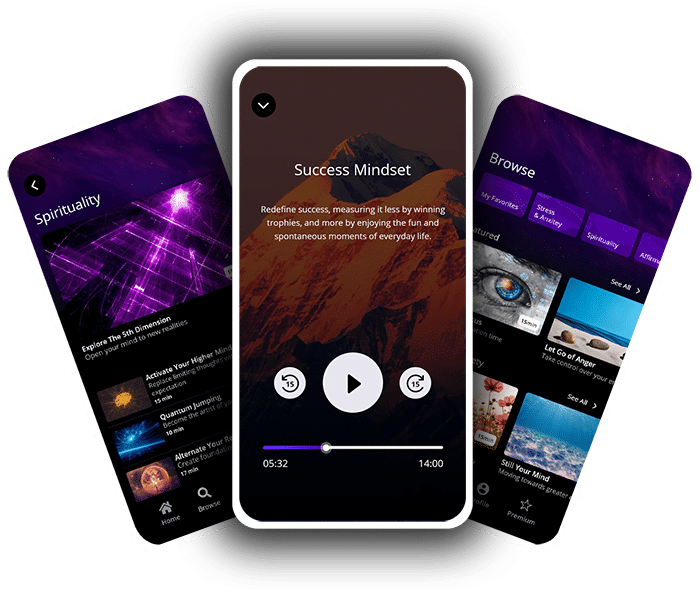Are your thoughts ruling your life? They shouldn’t be, according to the Emotional Freedom Technique (EFT), a unique method for reducing stress and anxiety. Apart from EFT there are plenty other ways you can achieve freedom from negative thoughts and emotions. This guide will help you embrace this powerful technique, teaching you how to step back from your thoughts and find peace in the present moment.
Ready to reclaim control? Star!

Unleash Your True Potential!
Explore the world of meditation with our powerful guided sessions crafted to bring peace and strength to your spirit.
But first, let’s ensure our sessions are the perfect fit for you.
Take our short quiz to find out!
Table of contents
Key Takeaways
- Your thoughts do not define you. They are just passing mental events that come and go.
- Understanding that you are separate from your thoughts can lead to emotional freedom and mental clarity.
- Negative thoughts can harm your well-being, but there are strategies you can use to manage them effectively, such as practicing mindfulness and challenging negative thinking patterns.
- Letting go of negative emotions and practicing forgiveness is crucial for emotional freedom and mental clarity. It allows space for positive emotions and experiences in your life.
Understanding Your Thoughts
Do your thoughts define you? Can you control them? Learn why your thoughts can be harmful and how to navigate through them.
Do they define you?
Your thoughts do not make you who you are. They come and go, but you stay the same. Anyone can have bad or good thoughts, it’s normal. Having a bad thought doesn’t mean you’re bad, just like having a good thought doesn’t make you good all the time.
You are more than your passing thoughts. You also observe them and gain wisdom from them. This is true self-awareness, which few people know they have.
Can you control them?
You can control your thoughts, but it is not easy. It takes time and practice to learn how to do this. The Emotional Freedom Technique (EFT) helps with this. EFT uses body points that are important in acupuncture while you say good things about yourself.
Another way to deal with thoughts is by going deep into them. This includes looking at automatic thoughts which just seem to “pop” into our heads without us thinking about them. This helps link emotions and the meaning behind these fast ideas that appear in our minds suddenly.
But there’s something else too: accepting feelings as messengers rather than hushing them up or pushing them away forcefully can assist too in taming wild streams of worrying musings, thus giving a break-free ride towards serenity.

Unleash Your True Potential!
Explore the world of meditation with our powerful guided sessions crafted to bring peace and strength to your spirit.
But first, let’s ensure our sessions are the perfect fit for you.
Take our short quiz to find out!
Why they can be harmful
Thoughts can be harmful to both your mind and body. If they are negative or troubled, they may cause stress and hurt your health. These thoughts can also lead to emotional sadness.
Letting these things control you is not good for mental health.
Harmful thoughts do more than just make you feel bad inside. They can also hurt your physical well-being. This means that a happy spirit might help keep you healthy as well! The way we think has true power over how we live our daily life.
The Truth About Your Thoughts

“You are your thoughts” It may be a phrase you’ve heard before, but what does it really mean? The truth is, you are not your thoughts. They do not define who you are as a person.
In fact, you are the observer of your thoughts, separate from them entirely. Understanding this fundamental truth can lead to emotional freedom and mental clarity in your life.
Who said “you are your thoughts”?
The saying “you are your thoughts” is commonly heard and believed by many individuals. It is a belief that suggests our thoughts define who we are as people. However, it’s important to understand that this belief is not true.
No specific person said this phrase, but it has been passed down through generations and adopted by society. Recognizing that you are not your thoughts is crucial for achieving emotional freedom and mental clarity in life.
What it really means
What it really means is that your thoughts do not define who you are as a person. They are just passing mental events that come and go. Your thoughts can be influenced by your environment, experiences, and even your emotions, but they don’t reflect your true self.
You are the observer of those thoughts, not the thoughts themselves. Understanding this can help bring emotional freedom and mental clarity because you can detach from negative or harmful thoughts that may be holding you back.
Instead of identifying with every thought that arises in your mind, you can recognize them for what they are – temporary and fleeting. This realization allows you to let go of unhelpful thoughts and focus on the present moment instead.
Realizing “you are not your thoughts”
Understanding that “you are not your thoughts” is a crucial step towards emotional freedom and mental clarity. Many people believe that their thoughts define who they are, but this isn’t true.
Thoughts are simply random mental occurrences that come and go. They don’t represent your true self or determine your worth.
By realizing that you are the observer of your thoughts, rather than being defined by them, you can break free from any negative thought patterns and self-judgment. This understanding allows you to distance yourself from unhelpful or harmful thoughts and choose which ones to give energy to.
Accepting that your thoughts do not define you opens up possibilities for personal growth and a healthier relationship with yourself. It empowers you to let go of negative inner dialogue and cultivate self-compassion.
How Your Thoughts Affect You

Your thoughts are powerful and they can leave equally powerful impact on your emotions and well-being. Discover strategies to deal with them and the importance of letting go of emotional freedom. Read more to find out how your thoughts affect you.
The negative impact
Negative thoughts can have an extremely hug impact on your well-being. They can make you feel anxious, sad, or stressed out. When you constantly focus on negative thoughts, it becomes hard to see the positive things in life.
Negative thinking can also affect your relationships with others and hinder your ability to enjoy experiences fully. It’s important to be aware of these negative thoughts and find ways to manage them effectively so that they don’t control your emotions and mental clarity.
Mindfulness practices like meditation and mindful acceptance can help you gain distance from your thoughts and let go of harmful patterns of thinking, leading to emotional freedom and better mental health overall.
Strategies for dealing with them
Dealing with your thoughts can be challenging, but there are strategies you can try to gain emotional freedom and mental clarity. Here are some helpful techniques:
- Practice mindfulness: Pay attention to the present moment without judgment. Focus on your breath or senses to help anchor yourself in the now.
- Challenge negative thoughts: Identify negative thinking patterns and replace them with positive or realistic alternatives. Practice reframing and focusing on the facts rather than assumptions.
- Use thought-stopping techniques: When intrusive or unhelpful thoughts arise, say “stop” or imagine a red stop sign to interrupt them. Then, redirect your attention to something more positive or productive.
- Engage in self-care activities: Take time for activities that bring you more joy, peace of mind and relaxation, such as exercising, listening to music, spending time in nature, meditating or practicing creative hobbies.
- Seek support from others: Talk to a trusted friend, family member, or therapist about your thoughts and emotions. Sharing your experiences can provide perspective and validation.
- Write down your thoughts: Keep a journal where you can express your feelings and concerns on paper. This can help release pent-up emotions and gain clarity about what’s bothering you.
The importance of letting go
Letting go is crucial for emotional freedom and mental clarity. Holding onto negative emotions like anger and shame can weigh you down and hinder your overall well-being. When you learn to let go, you free yourself from the burden of negativity, allowing space for positive emotions and experiences to enter your life.
Additionally, letting go of control over external factors can help you to focus on what really matters – your own ideas, feelings, and actions. It empowers you to take charge of your own happiness and live a more fulfilling life.
Letting go is not about forgetting or condoning past hurts; it’s about acknowledging them, learning from them, and choosing to release the attachment to pain. By practicing forgiveness and creating distance from toxic situations or people, you open yourself up to understanding, empathy, and compassion towards others as well as yourself.
Practices for Emotional Freedom
To achieve emotional freedom, practice getting distance from your thoughts, engage in meditation to release them, and embrace mindful acceptance.
Teeny Tiny Practice: Getting Distance From Your Thoughts
One simple way to start gaining perspective on your thoughts is by practicing the “Teeny Tiny” technique. Here’s how you can do it:
- Take a deep breath and pause for a moment.
- Imagine that these thoughts are like clouds passing by in the sky.
- As each thought arises, imagine placing it gently on one of those passing clouds.
- Watch as the cloud carries your thought away, gradually disappearing into the distance.
- Repeat this process with each new thought that comes up, allowing them all to float away on their own cloud.
Meditation for releasing thoughts
Meditation can help you let go and release your thoughts and achieve emotional freedom and mental clarity. Here are some techniques you can try:
- Focus on your breath: Sit in a comfortable position and take slow, deep breaths. As you breathe in and out, notice the sensations. Whenever thoughts come up, gently bring your attention back to your breath.
- Body scan meditation: Start by focusing on one part of your body, like your toes or fingers. Slowly move your attention throughout your entire body, noticing any sensations or tension you may be holding onto. Allow yourself to release any tension as you continue scanning through each part of your body.
- Loving-kindness meditation: Imagine sending loveing and kind energy to yourself, a loved one, a friend, and even someone who may have caused you pain or difficulty. Visualize these people surrounded by love and wish them well. This practice helps cultivate compassion and reduces negative thoughts towards others.
- Guided visualization meditation: Use a guided meditation recording or app that leads you through visualizing a peaceful scene or positive experience. Allow yourself to deeply immerse in the visualization, letting go of any thoughts that arise during the process.
Mindful acceptance
Mindful acceptance is a powerful practice that can help you find emotional freedom and mental clarity. It involves being fully present and aware of your thoughts and feelings without judging them or getting caught up in them.
Instead of trying to resist or control your thoughts, mindful acceptance allows you to observe them with curiosity and nonjudgmental awareness. This practice can help you develop a more compassionate relationship with your thoughts, recognizing that they are just passing mental events and not an accurate reflection of who you are.
By accepting your thoughts without attaching to them, you can cultivate inner peace, reduce stress, and improve your overall well-being. Mindful acceptance is a key component of mindfulness interventions that have been shown to enhance mental health and happiness.
The Power of Living in the Present Moment

Living in the now has the ability to transform your entire experience, bringing a sense of peace and clarity that can’t be found in dwelling on past regrets or future worries.
How living in the now changes everything
Living in the present moment has the power to transform your life. When you focus on the here and now, you let go of worries about the past or future. This brings a sense of inner peace and contentment.
Living in the now allows you to fully experience each moment, finding joy in even the smallest things. It helps you appreciate life’s beauty and be more mindful of your surroundings.
By embracing the present, you can reduce stress, improve your mental health, and cultivate a greater sense of happiness and well-being overall.
Just being
In the midst of our thoughts, there is a space where we can simply exist. It’s called “just being.” In this state, we are fully present in the here and now, without getting caught up in the endless stream of thoughts that flow through our minds.
When we practice “just being,” we become observers of our thoughts rather than identifying with them. We realize that our thoughts do not define us; they are just passing mental events.
By embracing the power of “just being,” we can find emotional freedom and mental clarity. Instead of allowing our thoughts to dictate how we feel or define who we are, we can cultivate a sense of detachment from them.
This doesn’t mean suppressing or ignoring our thoughts; it means recognizing that they are separate from our true selves. Through mindfulness practices like meditation and mindful acceptance, we can learn to let go of the grip that negative or harmful thoughts have on us.
Living in the present moment is key to experiencing the transformative effects of “just being.” Our entire existence takes place in the now, yet so often, we get caught up in regrets about the past or worries about the future.
But when we bring ourselves back to this very moment – observing without judgment – everything changes. We become more attuned to ourselves and our surroundings, leading to increased self-awareness, better performance, and overall well-being.
Conclusion
In conclusion, remember that you are not your thoughts. Your thoughts may be powerful, but they don’t define who you are. By recognizing this truth and practicing strategies like meditation and mindful acceptance, you can find emotional freedom and mental clarity.
Let go of harmful thoughts and live in the present moment – it can change everything for the better. So, start embracing the power within yourself to observe your thoughts without being consumed by them, and experience a newfound sense of peace and happiness.
FAQs
What does “you are not your thoughts” mean?
“You are not your thoughts” means that you are the observer of your thoughts, not the thoughts themselves.
Are our thoughts real?
Yes, our thoughts are real, but they don’t define us as we are not our thoughts.
How can we understand that “your thoughts are not you”?
Understanding that “your thoughts are not you” means knowing that they’re just ideas in your mind and do not represent who you truly are.
Why is it said “thoughts are just thoughts”?
When we say “thoughts are just thoughts”, it reminds us that they’re only in our minds and doesn’t have to control or define us.










